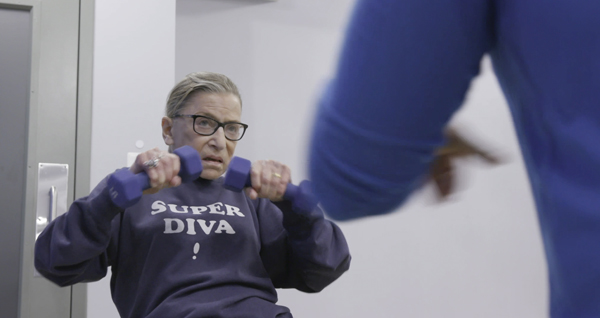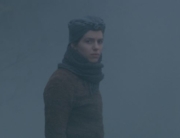![]() RBG had the female critics in tears at the press screening I attended. We were moved by the accomplishments and impact tiny Ruth Bader Ginsburg has had on so many lives and how the appreciation of her work is growing across generations.
RBG had the female critics in tears at the press screening I attended. We were moved by the accomplishments and impact tiny Ruth Bader Ginsburg has had on so many lives and how the appreciation of her work is growing across generations.
Directors Betsy West and Julie Cohen respectfully interview U.S. Supreme Court Justice Ginsburg, at the age of 84, about her parents; education, from Brooklyn public schools to Ivy League law schools; marriage; the groundbreaking cases she argued before the Supreme Court; the precedent-setting judgments she issued on the federal and Supreme Court benches; and her important dissents that have cut through the increasingly conservative courts. Her age is belied by an intense daily workout with her personal trainer, and each segment of her life and work is illustrated by interviews with those who illuminate points beyond her modest statements.
Justice Ginsburg becomes effusive when talking about three people who had an impact in her life. Her education-encouraging mother Celia, who died from cancer just before her daughter graduated high school, set standards Ginsburg still follows: “Be a lady” and “Be independent.” (Only a bare background on her Jewish roots and connection to her heritage is provided,)
The second person is her husband, the late Martin Ginsburg, and the film is full of wonderful anecdotes about his admiration of her smarts and his support of her ambitions, from their first date in college and through their law school years, her frustrating job searches, up through his active lobbying on her behalf to be selected by President Bill Clinton to the Supreme Court in 1993. (Her adult children say they insisted on his cooking over hers.)
Surprisingly not mentioned is how he genially took credit for spurring her from leading an academic seminar on “Women and the Law” to litigating against gender discrimination, under the aegis of the American Civil Liberties Union (ACLU). The 1972 case of a man who protested that it was unfair that the Internal Revenue Service didn’t provide the same deduction for a dutiful son caring for his mother as it did for a daughter set the model for how she proceeded to, step-by-step, convince the courts that such legal differences were not just unfair but unconstitutional.
From that case, the government’s documentation of gender distinction in federal laws provided the “to-do list” for her new Women’s Rights Project at the ACLU, praised here by Gloria Steinem. Her significant victorious cases to the Supreme Court come to life through interviews with Ginsburg’s clients. Sharron Frontiero, of Frontiero v. Richardson (1973), was a married woman in the U.S. Air Force who sought the same housing benefits as her male colleagues. Stephen Wiesenfeld, of Weinberger v. Wiesenfeld (1975), was the widowed father of a young son who benefited from her winning Supreme Court argument that widowers should have the same Social Security child support as widows.
Beneficiaries of her Supreme Court majority decisions and minority dissents are also highlighted. United States v. Virginia (1996), which ruled women should be admitted to Virginia Military Institute (VMI), is celebrated at the 20th anniversary of the decision, where Ginsburg basks on stage in an auditorium full of grateful female VMI students and alumna. Additionally, she urged Congress to rectify the terms for women claiming pay discrimination that had been rejected by the majority in Ledbetter v. Goodyear (2007)—Lilly Ledbetter was honored when President Obama signed the Lilly Ledbetter Fair Pay Act in 2009. Ginsburg still doesn’t mince words on gender discrimination; writing for the majority in Sessions v. Morales-Santana (2017), she declared a longer citizenship qualification for fathers over mothers “stunningly anachronistic.”
The third, and perhaps most unexpected, person who has featured prominently in her life is her Supreme Court colleague and ideological opposite, the late, very conservative Justice Antonin Scalia. She grins recalling their friendship and joint family vacations, and especially their shared love of opera—delightful clips reveal their gleeful, costumed cameos in Washington National Opera productions. From such civil friendships majority decisions can sometimes be crafted.
The directors touch on the Justice’s new visibility to young people through popular culture. She practically giggles that her social media moniker of “The Notorious RBG” conflates her with a fellow Brooklynite, rapper the Notorious B.I.G. (The inspired meme creator is also interviewed.) The filmmakers introduce her to Kate McKinnon’s impersonations on Saturday Night Live, which she finds quite funny. Her granddaughter, newly admitted to the bar, says, “We just call her Bubbe.”
If you, too, want to dress up as Justice Ginsburg, the variety of collar decorations she wears over her robes are called jabots. She wears a black one with silver crystal accents when she reads a dissent from the bench, as she just did when she protested the decision upholding mandatory individual arbitration in Epic Systems Corp. v. Lewis: “Nothing compels the destructive result the court reaches today.” Her feistiness continues!







Leave A Comment